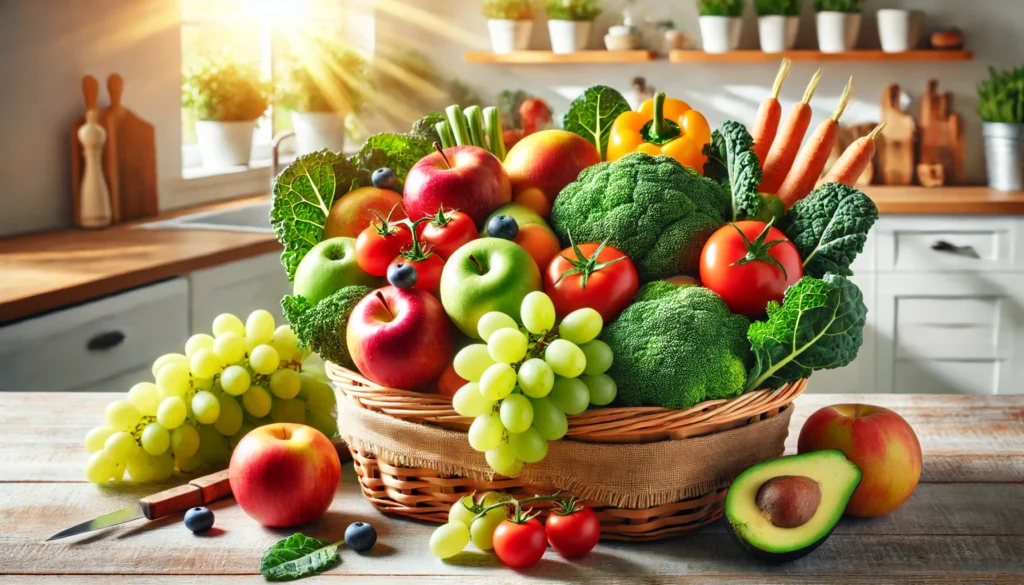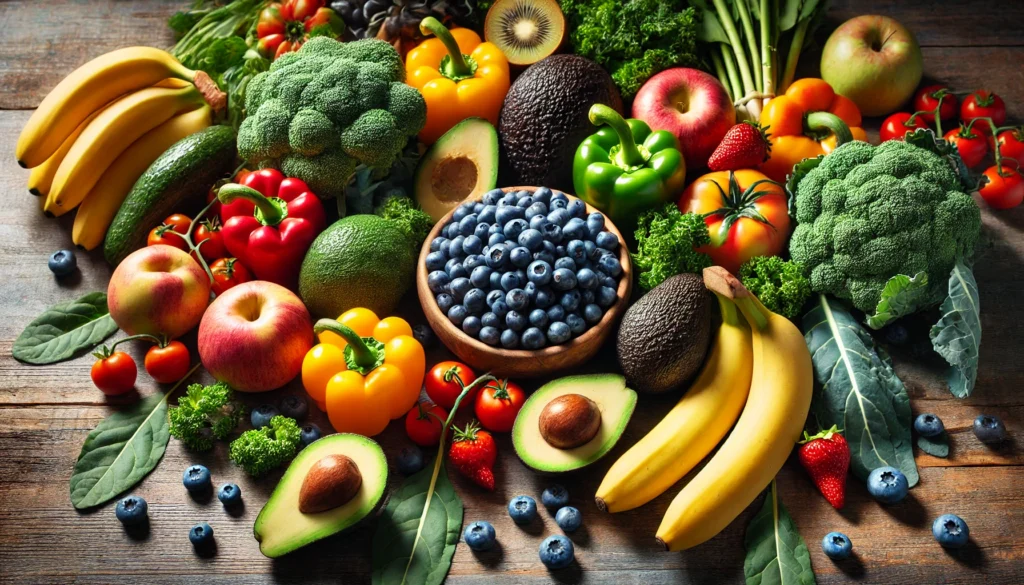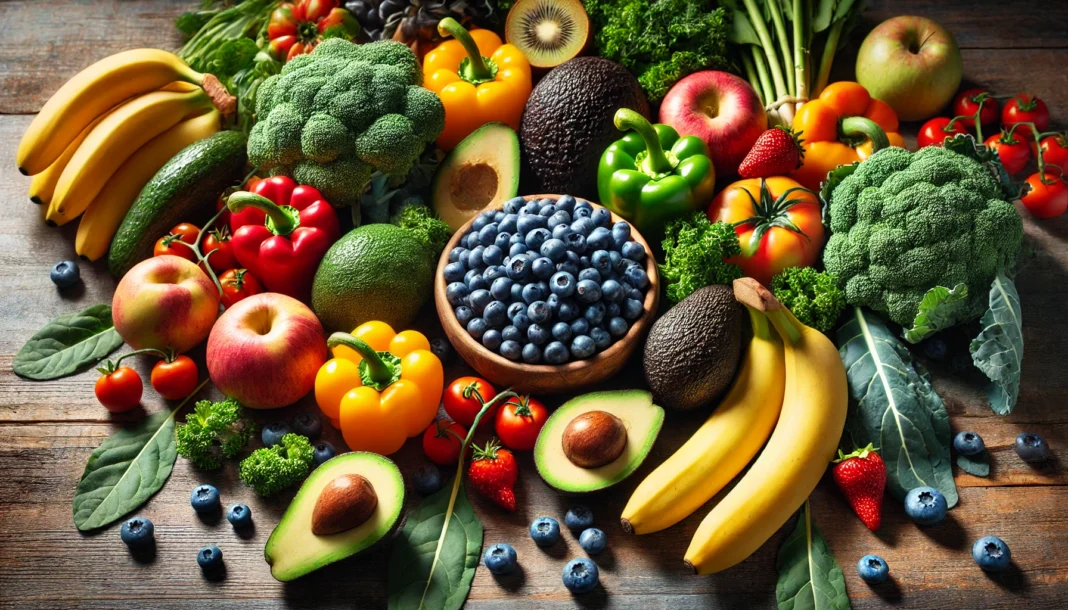Introduction: The Essential Role of Vitamins in Fruits and Vegetables
Fruits and vegetables serve as the foundation of a well-balanced, nutrient-rich diet, offering a vast array of essential vitamins that contribute to overall health and wellness. Understanding the vitamins in fruits and vegetables is crucial for making informed dietary choices that promote optimal bodily function. The natural composition of plant-based foods provides bioavailable nutrients, meaning the body can absorb and utilize them efficiently. However, many people remain unaware of the specific vitamins that different fruits and vegetables contain and how these nutrients impact health. By exploring the nutrient profiles of various plant foods, individuals can tailor their diets to support their unique health needs, ensuring they receive adequate amounts of essential vitamins.
You may also like: What Is Bioavailability in Nutrition? A Simple Explanation of How Nutrients Are Absorbed and Utilized
In a world increasingly reliant on processed foods and dietary supplements, the importance of consuming whole, nutrient-dense foods cannot be overstated. Many health-conscious individuals ask, “Which vitamins do vegetables have?” or “What are the best sources of vitamins in fruits?” These questions highlight the need for greater awareness of the nutritional value found in plant-based foods. A deeper understanding of how vitamins function in the body allows for better decision-making when it comes to food choices, ultimately enhancing well-being and reducing the risk of chronic diseases.

The Diversity of Vitamins in Fruits and Vegetables
Fruits and vegetables provide an extensive selection of vitamins, each playing a distinct role in supporting physiological functions. These nutrient-dense foods are particularly rich in water-soluble vitamins such as vitamin C and the B-complex group, as well as fat-soluble vitamins like vitamins A, D, E, and K. The bioavailability of these vitamins varies depending on the type of food, preparation methods, and individual health conditions.
For example, vitamin C is a powerful antioxidant that supports immune function, promotes collagen synthesis, and enhances iron absorption. Citrus fruits, strawberries, bell peppers, and kiwi are particularly abundant in this essential vitamin. Conversely, vitamin A, which is vital for vision, skin health, and immune function, is commonly found in brightly colored vegetables such as carrots, sweet potatoes, and spinach. By incorporating a wide variety of colorful produce into the diet, individuals can ensure they receive a full spectrum of necessary vitamins.
One of the main advantages of consuming vitamins in veggies is their natural synergy with other beneficial plant compounds. Many fruits and vegetables contain phytonutrients that enhance the absorption and efficacy of vitamins, creating a more holistic approach to nutrition compared to isolated supplements. By choosing whole, unprocessed plant foods, individuals can optimize their vitamin intake and promote long-term health benefits.
Understanding Which Vitamins Do Vegetables Have
When selecting vegetables for their vitamin content, it is essential to recognize the diversity of nutrients found in different plant varieties. Leafy greens such as kale, spinach, and Swiss chard are particularly rich in vitamin K, which plays a crucial role in blood clotting and bone health. Additionally, cruciferous vegetables like broccoli and Brussels sprouts provide ample amounts of folate, a B-vitamin necessary for DNA synthesis and cell division.
Root vegetables, including carrots and sweet potatoes, stand out as excellent sources of beta-carotene, a precursor to vitamin A that supports vision and immune function. Meanwhile, bell peppers and tomatoes offer an impressive concentration of vitamin C, further enhancing immune defenses and skin health. Understanding the vitamin content of vegetables enables individuals to create well-balanced meals that address specific nutritional needs and promote overall wellness.
Another vital aspect of vegetable consumption is the impact of cooking methods on vitamin retention. While some vitamins remain stable during cooking, others, particularly water-soluble vitamins like vitamin C and certain B vitamins, may degrade when exposed to heat, light, and air. Steaming and roasting vegetables at lower temperatures can help preserve their nutrient content, ensuring maximum health benefits. By making informed choices regarding preparation methods, individuals can retain the valuable vitamins found in vegetables while enhancing their culinary experience.
Exploring the Rich Array of Vitamins in Fruits
Fruits are not only delicious but also packed with essential vitamins that support various bodily functions. One of the most well-known nutrients in fruits is vitamin C, which is abundant in citrus fruits, strawberries, and papayas. This potent antioxidant aids in collagen formation, immune defense, and iron absorption, making it a vital component of a healthy diet.
Additionally, many fruits contain significant amounts of B vitamins, particularly folate and vitamin B6. Bananas, avocados, and oranges provide these essential nutrients, which contribute to brain function, energy metabolism, and red blood cell formation. Folate, in particular, is critical for pregnant women as it supports fetal development and helps prevent neural tube defects.
Fruits and vegetables vitamin profiles often overlap, providing a comprehensive range of nutrients necessary for overall health. For instance, vitamin A, found in mangoes, cantaloupe, and apricots, plays a key role in vision and immune function. Furthermore, vitamin E, a powerful antioxidant that protects cells from oxidative damage, is present in fruits such as kiwis, blackberries, and almonds. By consuming a variety of fruits daily, individuals can obtain a well-rounded intake of essential vitamins that promote longevity and vitality.

Frequently Asked Questions (FAQ)
1. Which vitamins do vegetables have that are essential for daily health?
Vegetables are rich in a variety of essential vitamins, contributing significantly to overall well-being. Leafy greens like spinach and kale provide high amounts of Vitamin K, which is crucial for blood clotting and bone health. Root vegetables such as carrots are packed with beta-carotene, a precursor to Vitamin A, which supports vision and immune function. Cruciferous vegetables like broccoli and Brussels sprouts contain Vitamin C, which boosts immune function and aids collagen production. Understanding which vitamins do vegetables have helps in making informed dietary choices that enhance long-term health.
2. How do vitamins in veggies contribute to long-term health benefits?
The vitamins in veggies play a fundamental role in maintaining long-term health by reducing the risk of chronic diseases. For instance, antioxidants found in vegetables help fight free radicals, reducing inflammation and the likelihood of developing cardiovascular diseases. Additionally, B vitamins found in legumes and whole vegetables assist in energy metabolism and brain function, essential for sustaining daily activities. Consuming a diet rich in vegetables and vitamins promotes gut health by providing fiber, which supports digestion. Incorporating a variety of vegetables into your diet ensures a balanced intake of essential nutrients for long-term well-being.
3. What are the best sources of vitamins in fruits?
Fruits provide an excellent source of essential vitamins, each contributing to different aspects of health. Citrus fruits like oranges and grapefruits are packed with Vitamin C, which strengthens the immune system and enhances skin health. Bananas contain high amounts of Vitamin B6, important for brain development and mood regulation. Berries, such as strawberries and blueberries, are rich in antioxidants and Vitamin K, which contribute to heart and bone health. Understanding the vitamins in fruits allows individuals to tailor their diets to meet specific nutritional needs and optimize health outcomes.
4. How do fruits and vegetables vitamin content compare in terms of health benefits?
Both fruits and vegetables offer essential vitamins, but they differ in nutrient density and function. Vegetables often contain higher amounts of certain B vitamins and minerals, which support metabolic functions and energy production. Fruits, on the other hand, tend to be richer in Vitamin C and antioxidants, which aid in immune function and reduce oxidative stress. The combination of both fruits and vegetables vitamin content in a diet creates a well-rounded nutrient profile that supports overall health. Including a diverse range of produce ensures that the body receives a broad spectrum of vitamins necessary for optimal function.
5. How can vegetables and vitamins impact mental health?
Vegetables and vitamins play a crucial role in supporting mental health by reducing stress and improving cognitive function. Leafy greens, rich in folate, contribute to serotonin production, which enhances mood and reduces symptoms of depression. Magnesium, found in dark green vegetables and legumes, aids in relaxation and stress management. Vitamin C from bell peppers and citrus fruits reduces cortisol levels, helping the body cope with stress. Consistently consuming vegetables and vitamins in a balanced diet supports not only physical but also mental well-being.
6. How do cooking methods affect vitamins in veggies?
Cooking methods can significantly impact the retention of vitamins in veggies, either preserving or depleting their nutritional value. Steaming vegetables helps retain water-soluble vitamins like Vitamin C and B vitamins, which are often lost during boiling. Roasting can enhance the absorption of fat-soluble vitamins, such as Vitamin A and K, by breaking down plant cell walls. On the other hand, deep frying or prolonged cooking can destroy heat-sensitive vitamins, reducing the overall nutritional benefits. Understanding the best cooking methods ensures that the vitamins in veggies remain intact, maximizing their health benefits.
7. How do vitamins in fruits differ between fresh and processed varieties?
Fresh fruits generally contain higher concentrations of essential vitamins compared to their processed counterparts. Processing methods such as juicing and canning can lead to the loss of water-soluble vitamins like Vitamin C, reducing their effectiveness. However, some processes, like freezing, can preserve vitamins in fruits effectively, ensuring they retain most of their nutritional value. Additionally, some processed fruits contain added sugars or preservatives that may counteract their natural health benefits. Choosing whole, fresh fruits whenever possible ensures maximum vitamin retention and overall health advantages.
8. How does vitamin absorption differ between fruits and vegetables?
The absorption of vitamins in fruits and vegetables depends on several factors, including fiber content, food combinations, and digestion efficiency. Fat-soluble vitamins, such as Vitamin A and K, require dietary fats for proper absorption, making it beneficial to pair them with healthy fats like olive oil or nuts. Water-soluble vitamins, like Vitamin C and B vitamins, are readily absorbed but require consistent intake as they are not stored in the body. Certain vegetables, like spinach, contain compounds that can inhibit mineral absorption, emphasizing the importance of a diverse diet. Understanding these factors ensures that fruits and vegetables vitamin intake is optimized for maximum health benefits.
9. How can seasonal changes affect the vitamins in veggies and fruits?
Seasonal variations can significantly impact the availability and nutritional content of fruits and vegetables. For example, leafy greens thrive in cooler seasons and contain higher concentrations of Vitamin C and iron, whereas summer fruits like berries provide antioxidant protection against sun damage. Seasonal produce is typically fresher, reducing the loss of essential nutrients during storage and transport. Eating a diet that aligns with seasonal produce ensures that the vitamins in fruits and vegetables are at their peak nutritional value. Being mindful of seasonal availability also encourages variety in one’s diet, leading to a more comprehensive nutrient intake.
10. How can you maximize the benefits of fruits and vegetables vitamin intake?
To maximize the health benefits of fruits and vegetables vitamin intake, focus on consuming a variety of colors and types. Different colored fruits and vegetables indicate different nutrient profiles, ensuring a well-rounded intake of essential vitamins. Pairing foods strategically, such as eating Vitamin C-rich foods with iron-rich vegetables, enhances nutrient absorption. Proper storage methods, like refrigeration and minimal exposure to light, help preserve vitamin content in fresh produce. Being mindful of portion sizes and incorporating fruits and vegetables into every meal ensures consistent nutrient intake for long-term health benefits.

Conclusion: Harnessing the Power of Vitamins in Fruits and Vegetables
Understanding the extensive benefits of vitamins in fruits and vegetables empowers individuals to make informed dietary choices that support optimal health. By recognizing which vitamins do vegetables have and the essential nutrients found in fruits, individuals can take a proactive approach to wellness. Incorporating a diverse selection of colorful produce into daily meals ensures a well-balanced intake of vitamins that support immune function, energy metabolism, and overall well-being.
The natural synergy between vitamins, minerals, and phytonutrients in whole foods underscores the importance of prioritizing plant-based nutrition. While supplements can serve as an alternative in cases of deficiency, whole foods offer unparalleled bioavailability and additional health-promoting compounds. By making conscious decisions about food choices, preparation methods, and dietary variety, individuals can unlock the full potential of vitamins in veggies and fruits, fostering a healthier and more vibrant lifestyle.
vitamins in fruits, vitamins in veggies, which vitamins do vegetables have, vegetables and vitamins, fruits and vegetables vitamin, plant-based nutrition, essential vitamins, bioavailable nutrients, whole food nutrition, vitamin-rich diet, best sources of vitamins, nutrient absorption, immune-boosting foods, vitamin synergy, antioxidant vitamins, vitamin retention, natural health, superfoods, holistic nutrition, dietary wellness
Further Reading:
Health Benefits of Fruits and Vegetables
Health Benefits of Fruits and Vegetables1
Disclaimer
The information contained in this article is provided for general informational purposes only and is not intended to serve as medical, legal, or professional advice. While NewsHealthWatch strives to present accurate, up-to-date, and reliable content, no warranty or guarantee, expressed or implied, is made regarding the completeness, accuracy, or adequacy of the information provided. Readers are strongly advised to seek the guidance of a qualified healthcare provider or other relevant professionals before acting on any information contained in this article. NewsHealthWatch, its authors, editors, and contributors expressly disclaim any liability for any damages, losses, or consequences arising directly or indirectly from the use, interpretation, or reliance on any information presented herein. The views and opinions expressed in this article are those of the author(s) and do not necessarily reflect the official policies or positions of NewsHealthWatch.

